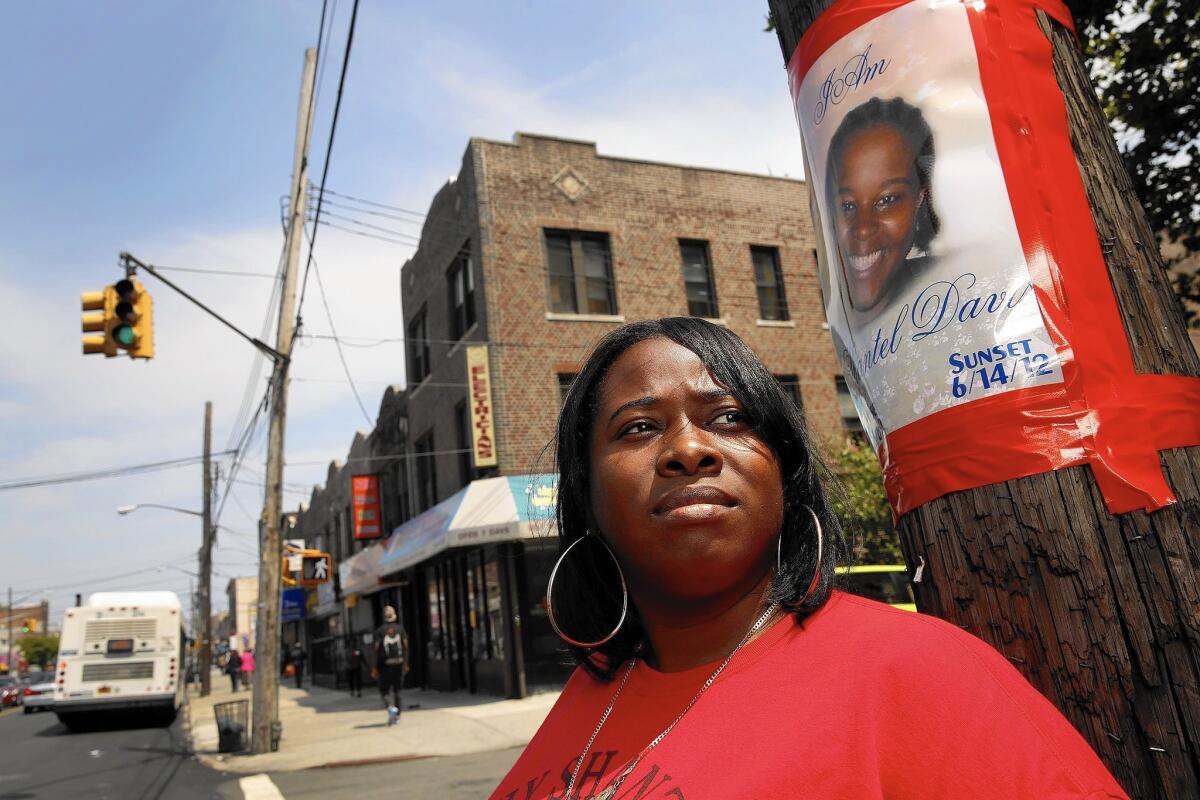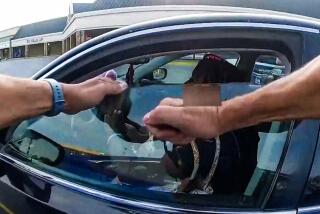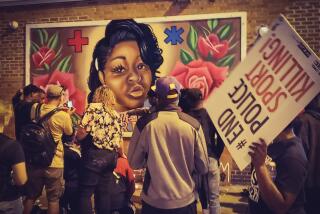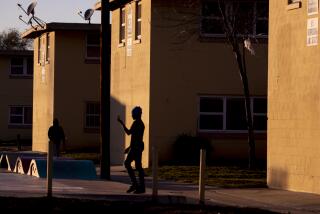SayHerName: Female black lives matter too

“The police portrayed her as a career criminal, but she was unarmed when they shot her,” says Natasha Duncan, standing on the Brooklyn corner where her sister Shantel Davis was killed by a police detective three years ago.
- Share via
Reporting from New York — Four months after Eric Garner died during an altercation with police on Staten Island, N.Y., officers in Cleveland found themselves struggling to subdue a 37-year-old with a history of mental illness.
As in Garner’s case, the person was black, unarmed and soon dead. As in Garner’s case, the death was declared a homicide.
Tanisha Anderson became one of more than two dozen black females who have died in custody or confrontations with law enforcement since 2000, but whose names never caught fire in the call for police reform as “Black Lives Matter” marchers called out the names of black males: Garner, Michael Brown, Tamir Rice, Freddie Gray. Anderson’s name remains largely unknown, even though she was killed just nine days before Rice, the 12-year-old shot by Cleveland police while playing with a toy gun.
Now, relatives of the women are trying to make sure their names are not forgotten, and they have joined forces with some of the same activists who marched in protests demanding justice for slain men. This time, they are demanding justice for slain women in a movement called SayHerName.
“If all black lives matter, women should be raised up as well,” said Karl Kumodzi, 23, who attended a New York rally last month, one of dozens held across the country to publicize the women’s names.
Kumodzi noted that it was women who launched the Black Lives Matter movement, which has swelled into a nationally known pressure group calling attention to deaths of unarmed black males. “We’re putting racism at the forefront, but people aren’t putting gender at the forefront,” Kumodzi said. “If all lives matter, you have to do that.”
Activists say there are several reasons black female deaths are not widely known. There are far fewer of them than those involving men and boys. In addition, videos implicating police in female deaths have not surfaced as they did in the cases of Garner, Rice and Walter Scott in North Charleston, S.C., in April.
But protesters at the May rallies said numbers and videos should not matter. They worry that if Americans are not aware of female victims, the abuses against them will be allowed to continue, hampering efforts to reform policing overall.
“You can’t leave one group behind, or you’ll just cause another problem down the line,” said Kisma Herman, 18. She said the onus is on national leaders, from the White House on down, to include women when they talk about justice and police reform.
“It starts on a national level, like with our president’s initiative, My Brother’s Keeper,” Herman said. President Obama launched My Brother’s Keeper after Trayvon Martin, an unarmed, black 17-year-old, was shot to death in 2012. The initiative is aimed at mentoring young black men and boys and helping them find jobs.
“It makes it seem like the boys come first, the boys matter, but these boys have sisters, and they come from mothers,” said Herman, adding that activist groups often have urged women to set aside gender-specific issues for the sake of the broader civil rights movement.
“The brothers are supposed to come first and then, once they’re OK, we can pay attention to the sisters,” Herman said. “But we’ve been waiting so long.”
As she spoke, relatives of dead women and girls stood on a stage in Manhattan’s Union Square telling the stories of their lost daughters, mothers and sisters.
“What happened to my daughter was unjust. It was very unjust,” Anderson’s mother, Cassandra Johnson, said as about 200 protesters waved large photographs of the women and chanted, “Say her name.”
Like cases involving men and boys, most of the females’ deaths have been mired in controversy, with police saying they felt threatened and witnesses alleging officers overreacted. Also like the cases involving men, most of the women were unarmed, many had histories of mental illness, and some had previous run-ins with police.
Some, though, were just unlucky.
They include:
-- Alberta Spruill, 57, who died of a heart attack when New York police acting on bad information broke down the door of her apartment on May 16, 2003, and threw a concussion grenade inside.
-- Aiyana Stanley-Jones, a 7-year-old Detroit girl who was shot dead exactly seven years later when police raided the home where she was sleeping.
-- Tarika Wilson, 26, who was shot dead on Jan. 4, 2008, in her Lima, Ohio, home by police searching for her boyfriend.
After two mistrials, a judge in April dismissed the remaining misdemeanor charge against the officer who shot Aiyana. In Wilson’s case, her family received a $2.5-million wrongful death settlement. In Spruill’s case, the city settled a wrongful death lawsuit for $1.6 million, and police apologized.
Even in cases involving women with histories of violence or crime, activists say there is no excuse for failing to call attention to their deaths.
“The numbers are not as high, so it’s easy for them to be swept under the rug,” said Natasha Duncan, whose sister, Shantel Davis, was shot to death by a New York police detective on June 14, 2012, after the stolen car she was driving crashed. “The movement needs to make sure they are not forgotten.”
Andrea Ritchie, a civil rights attorney in New York and the coauthor of a report issued last month by the African American Policy Reform on black women and law enforcement, said black females face risks not shared by men. They include sexual violence and harassment from law enforcement, said Ritchie, who testified about the issue in January before the President’s Task Force on 21st Century Policing.
The video showing a white policeman in Texas tackling an unarmed, black teenage girl in a swimsuit this month underscored those added risks, some activists have said. Zeba Blay, who writes on culture and women’s issues for the Huffington Post, wrote that the video, and another one last year showing a California Highway Patrol officer beating a 51-year-old woman, illustrated “the inherent reality of both physical and sexual harassment against black women and girls at the hands of cops.”
Both videos garnered national attention, but the females, Marlene Pinnock in California and Dajerria Becton in Texas, have not become household names.
Ritchie said that when she conducts workshops on police violence, she asks participants to name victims of law enforcement abuse. They mention Rodney King, Oscar Grant, Michael Brown, Amadou Diallo and other men. Never do they cite women, Ritchie said. “President Obama is making a tremendous conversational contribution, but he’s also limiting it,” Ritchie said, echoing activists who say Obama’s comments on the policing issue have focused on men and boys.
After a Florida neighborhood watch volunteer fatally shot Trayvon Martin, Obama — the father of two teenage girls — noted that if he had a son, he would have looked like Trayvon. When a jury acquitted George Zimmerman in that shooting, Obama spoke of the challenges facing African American men and boys.
In New York, Mayor Bill de Blasio has been open about the concerns he and his wife have had for their biracial teenage son, Dante, in his encounters with police. De Blasio has not discussed similar concerns he might have had for his daughter, Chiara, when she was a teenager.
A White House spokesperson said the president “recognizes the challenges that many communities face when it comes to addressing issues such as building trust with law enforcement, increasing equality and improving life outcomes for all young people.”
“This is the main reason he has created the White House Council on Women and Girls, the My Brother’s Keeper Task Force and the Task Force on 21st Century Policing — to ensure that everyone is able to live in communities where they feel safe, are treated equally and can live up to their full potential,” the spokesperson said. “This administration has also been a leader in tackling the issue of violence against women over the last six years. The president’s work in these areas addresses the persistent issues that are faced by all people with the ultimate goal of making our nation stronger for everyone.”
Activists, though, say more needs to be done to ensure women are not left out of the conversation.
Duncan, Davis’ sister, worries that cases such as her sister’s are being forgotten, even as the nation pays more attention to allegations of police abuse.
“That’s why I preach about this all the time,” said Duncan, who held a memorial service on the anniversary of Davis’ death at the Brooklyn intersection where she died.
“The police portrayed her as a career criminal, but she was unarmed when they shot her,” Duncan said. “That’s what’s important, and that’s what I want people to remember.”
The case is one of several reopened by Brooklyn Dist. Atty. Ken Thompson, who won election in fall 2013 on promises to fight racial bias in the justice system. It is unclear whether charges will be filed against the officer.
“We are still in the process of reviewing this case to make sure all investigative avenues have been explored,” a spokesman said.
Twitter: @tinasusman
More to Read
Sign up for Essential California
The most important California stories and recommendations in your inbox every morning.
You may occasionally receive promotional content from the Los Angeles Times.











